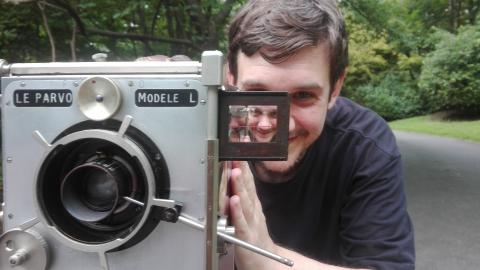Event
A Journey to the End of the World: Migration and Groundlessness in John Akomfrah’s The Nine Muses
Co-founder in 1982 of the legendary Black Audio Film Collective, John Akomfrah has earned an international reputation since the 1980s for his subtle and uncompromising counter-narratives of African diasporic experience and subjectivity. While his nonfiction films have been commonly received within the context of political modernism, Akomfrah’s most recent multiple screen-based installation suggest a new understanding of the experience of migration and of notions of home and homeland, which have animated his filmmaking since its inception. Through a close reading of The Nine Muses, I will argue that the 2010 film engages this most recent avenue of research in Akomfrah’s work, which fully comes to fruition in some of his multiple screen-based installations of the past few years: Vertigo at Sea (2015), Purple (2017), and Four Nocturnes (2019). The Nine Muses – I suggest – reorients the oppositional politics and historical counter-narratives that informed Akomfrah’s previous films in the context of a larger reconfiguration of global geopolitical relations determined by the advent of what Bruno Latour refers to as the New Climatic Regime. Reconceiving the experience of migration in terms of an inescapable condition, The Nine Muses alludes to the "universal lack of sharable space and inhabitable land" (Latour 2018, 9), and invites us to rethink geopolitics in light of the planet becoming a political actor in its own right. Intercutting archival footage of Caribbean and South Asian immigrants arriving to England in the 1950s with evocative tableau shots of two solitary and anonymous figures positioned in the inhospitable Alaskan landscape, The Nine Muses urges the viewers to imagine "the possibility of life in capitalist ruins" (Tsing 2015), the possibility of a home in the homelessness awaiting everyone at the end of the world, where the human journey concludes.
Peter Lešnik is a visiting scholar and lecturer in the Cinema & Media Studies Program and in the Italian Program at the University of Pennsylvania. He earned a Ph.D. from Penn in the summer of 2019, with a dissertation on Michelangelo Antonioni’s screen adaptations of literary works (Michelangelo Antonioni and the Rites of Adaptation: The Impure of an Adaptive Auteur). He has published articles on Antonioni’s cinema, adaptation theory, and ecocinema, in addition to essays on Italian modern and contemporary literature. While revising his dissertation for publication, he has currently begun working on his second book project, tentatively entitled Impaired Vision: The World Seen from the Margins of the Empire. This new project will focus on a set of films and time-based media works that challenge colonial ideology, not only in terms of their representational content, but most fundamentally through the creation of modes of vision and the adoption of visual strategies that expose, deconstruct, and subvert hegemonic practices of seeing.
A screening of The Nine Muses (John Akomfrah, 2010, 1h 30min) will be organized on Monday, February 24, at 5:30pm in 401 Fisher-Bennett Hall on Penn campus. If you plan to attend the screening, please email Peter Lešnik (plesnik@sas.upenn.edu) by Friday, February 21.

